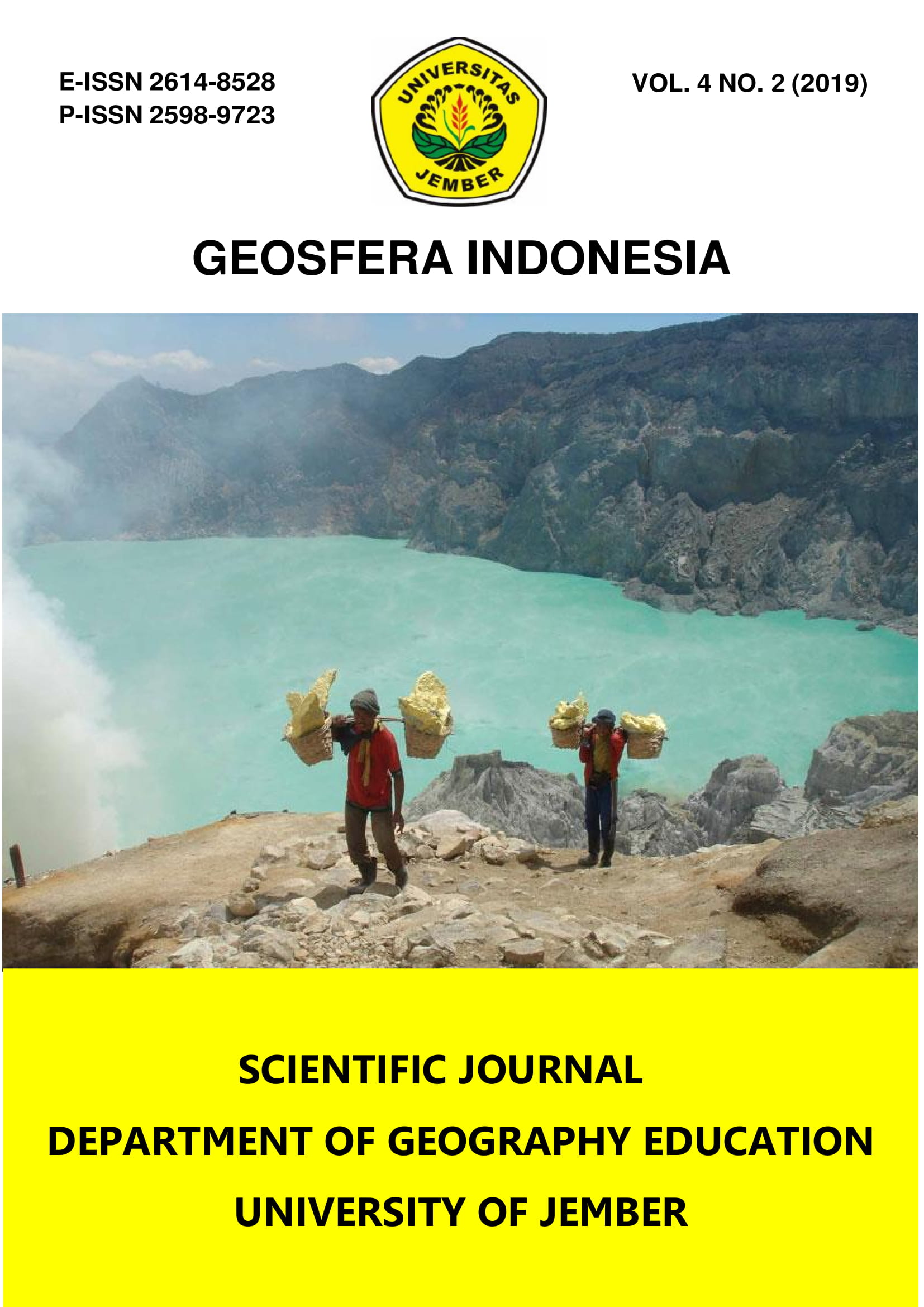IMPROVING THE LEARNING OUTCOMES OF KNOWLEDGE AND INQUIRY SKILL DOMAIN ON THIRD GRADE STUDENTS OF SMP NEGERI 14 KENDARI THROUGH THE GUIDED INQUIRY LEARNING MODEL ASSISTED BY SCIENCE KIT
DOI:
https://doi.org/10.19184/geosi.v4i2.10097Keywords:
learning outcome knowledge, inquiry skill, guided inquiry, science KITAbstract
The study aims to improve the learning outcomes in the field of knowledge and inquiry skill in class VIII 5 SMP Negeri 14 Kendari on the subject matter of light in atmosphere as the effect of applying the guided inquiry learning model assisted by science KIT. The method of the study used a classroom action research with research design is cycle model. The research subject is the students of class VIII 5 SMP Negeri 14 Kendari in the academic year 2016/2017 which consist of 26 students. The learning data achievements of the learners' realm were obtained through the learning result test (cycle test), the skill data of the learners were obtained through the inquiry sheet, and then was analyzed used the descriptive statistics. Results of data analysis are: 1) learning outcomes increased from 60,31 in cycle I to 75 in cycle II; 2) the students group inquiry skill increased form average value 2.68 (enough category) in the cycle I to 3.15 (good category) in cycle II; 3) the students mastery learning percentage increase from 42.31% (11 students) in cycle I to 77% (20 students) in cycle II. It could be concluded that the implementation of guided inquiry learning model assisted by science KIT could improve the learning outcomes of knowledge and inquiry skill domain on Class VIII 5 SMP Negeri 14 Kendari in the subject matter of light in atmosphere.
Keywords: guided inquiry, inquiry skills, learning outcomes,science KIT.
References
Ahmadi, L. (2015). Pemanfaatan Alat KIT pada Pembelajaran.Gorontalo: Universitas Negeri Gorontalo.
Aksa, F.I., Utaya, S., & Bachri, S. (2019). Geografi dalam Perspektif Filsafat Ilmu. Majalah Geografi Indonesia,33(1), 43-37.
Amaliana, I. (2017). Teacher-centered or Student-centered Learning Approach to Promote Learning?. Jurnal Sosial Humaniora, 10(2), 59-70.
Anderson, L.W., & Krathwohl, D.R. (2015). Kerangka Landasan untuk Pembelajaran, Pengajaran, dan Asesmen Revisi Taksonomi Pendidikan Bloom (A. Priantoro, Trans.). Yogyakarta: Pustaka Pelajar.
Arikunto, S. (2016). Prosedur Penelitian Suatu Pendekatan Praktik. Jakarta: Rineka Cipta.
Depdiknas. (2004). Kurikulum Mata PelajaranSains SMP danMTs.Jakarta: Depdiknas.
Greenwald, R.R.,&Quitadamo, I.J. (2014). A Mind of Their Own: Using Inquiry-based Teaching to Build Critical Thinking Skills and Intellectual Engagement in an Undergraduate Neuroanatomy Course. The Journal of Undergraduate Neuroscience Education, 12(2), 100-106.
Hardianti, T., & Kuswanto, H. (2017). Difference among Levels of Inquiry: Process Skills Improvement at Senior High School in Indonesia. International Journal of Instruction, 10(2), 119-130.
Hidayati, D.N., Amaluddin, L.O., & Surdin. (2016). The Effect Guided Inquiry to Critical Thinking Ability to Build Student Character in Geography Subject. Social Science, Education and Humanities Research,9(1), 367-371.
Kuhlthau, C.C., Maniotes, L.K., & Caspari, A.K. (2015). Guided Inquiry: Learning In The 21st Century(2nd ed.). California: Libraries Unlimeted.
Mulyana, S., Rusdi, & Vivanti, D. (2018). The Effect of Guided Inquiry Learning Model and Scientific Performance on Student Learning Outcome. Indonesian Journal of Science and Education, 2(1), 105-109.
Niana, R., Sarwanto, & Ekawati, E.Y. (2016). The Application of Guided Inquiry Model on Physic Learning to Improve Scientific Attitude and Students Analysis Ability. Proceedings of the 2nd International Conference on Teacher Training and Education Sebelas Maret University,2(1), 605-615.
Piaget, J. (1970). Science of Education and the Psychology of The Child. New York: Wiley.
Putra, M.I.S., Widodo, W., & Jatmiko, B. (2016). The Development of Guided Inquiry Science Learning Materials to Improve Science Literacy Skill of Prospective MI Teachers.JPII, 5(1), 83-93.
Riduwan. (2015). Dasar-Dasar Statistika. Bandung: Tarsito.
Sanjaya, W. (2014). Strategi Pembelajaran. Jakarta: Kencana Prenada Media Group.
Sapriya. (2014). Pendidikan IPS. Bandung: RemajaRosdaKarya.
Sarwi, S.,& Prayitno, W.W. (2016). Implementation of Guided Inquiry Physics Instruction to Increase An Understanding Concept and to Develop The Students Character Conservation. JurnalPendidikanFisika Indonesia,12(1), 1-7.
Sitorus, H.H., Hasruddin, & Edi, S. (2017). The Influence of Inquiry Learning Model on Student’s Scientific Attitudes in Ecosystem Topic at MTs. Daarul Hikmah Sei Alim (Islamic Junior High School) Asahan. International Journal of Humanities Social Sciences and Education (IJHSSE), 4(11), 170-175.
Sohibun. (2014). Penerapan Strategi Belajar Dengar Lihat Kerjakan (Delikan) Berbasis Laboratorium Mini terhadap Ketrampilan Proses Sains (KPS) Siswa SMA Kelas X MIA. Jurnal Imliah Edu Research, 3(1), 53-67.
Sudjana, N. (2014). Penelitian Hasil Proses Belajar Mengajar. Bandung: Remaja Rosdakarya.
Sugiyono. (2014). Metode Penelitian Pendidikan Pendekatan Kuantitatif, Kualitatif, dan R&D. Bandung: Alfabeta.
Tim Direktorat Pembinaan SMP. (2017). Panduan Penilaian oleh Pendidik dan Satuan Pendidikan Sekolah Menengah Pertama. Jakarta: Kementerian Pendidikan dan Kebudayaan Direktorat Jenderal Pendidikan Dasar dan Menengah Direktorat Pembinaan Sekolah Menengah Pertama.
Wardani, S., Nurhayati, S., & Safitri, A. (2015). The Effectiveness of the Guided Inquiry Learning Module towards Students’ Character and Concept Understanding. International Journal of Science and Research (IJSR), 5(6), 1589-1594.
Yewang, M.U.K., Degeng, I.N.S., Setyosari, P., & Sulton. (2016). The Effect of Guided Inquiry Learning Method VS Free Inquiry Against Learning Outcomes. International Conference on EducationUM, 561-568.
Zaini, M. (2016). Guided Inquiry Based Learning on the Concept of Ecosystem Toward Learning Outcomes and Critical Thinking Skills of High School Student. IOSR Journal of Research & Method in Education (IOSR-JRME), 6(6), 50-55.
Copyright (c) 2019 Geosfera Indonesia Journal and Department of Geography Education, University of Jember

This work is licensed under a Creative Commons Attribution-Share A like 4.0 International License



